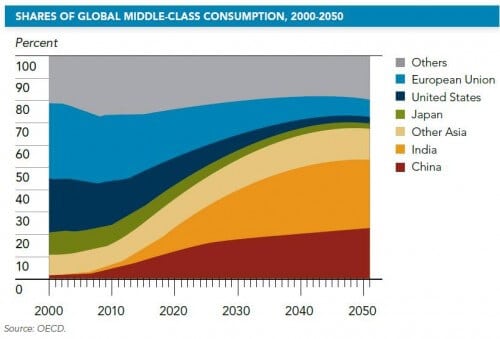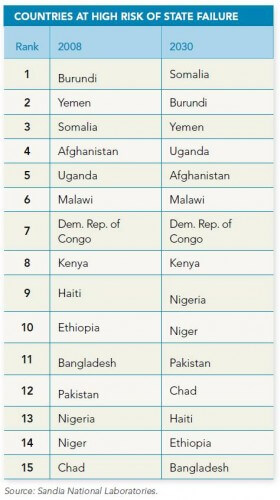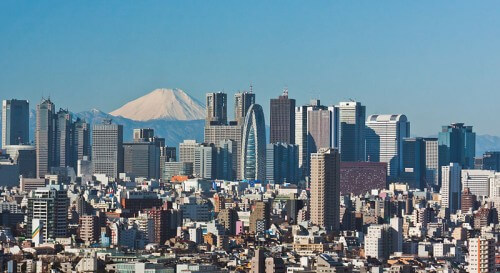This week the fifth report of the US National Intelligence Council was released for publication, surveying the way the world will look in 2030
This week the fifth report of the US National Intelligence Council was released for publication, surveying the way the world will look in 2030. Contrary to what is said in the newspapers, this is not an attempt to predict the future, but a document designed to explain to the decision makers in the US government what the critical factors are expected to be. (in the opinion of the authors) to influence the world in the next two decades, and present a number of surprises that may change the rules of the game and all predictions.
According to the authors, there are four mega-trends that shape the face of the present and are about to take us to a future different from the one that exists today. We will briefly review each of them.
Super Trend 1: Personal Empowerment

Today, a billion people live in conditions of extreme poverty and earn less than 1.25 dollars a day. One billion people suffer from malnutrition. This situation is changing, and an increasing number of people are breaking out of poverty, especially in China. The world is expected to be less poor in the coming decades, something that will be reflected in the expansion of the middle class around the globe, and the expansion of education and health care to a larger part of the population. Communication technologies - smartphones and the Internet - will be responsible for a large part of the improvement in education and health. Already today, 65% of the African population has smartphones that help them acquire knowledge and deal with problems like epidemics. In fact, the number of deaths from infectious diseases (AIDS, diarrhea, malaria, respiratory infections) is expected to decrease by thirty percent by 2030.
Hope is expressed in the report that the latest communication technologies will allow Muslim women mainly to join social media and take part in online communities where issues such as women's rights and gender equality under the laws of Islam will be discussed. Over time, these women may change the societies and even the governance methods in their countries.
Sounds good? Definitely. But personal empowerment also has a dark side. Any individual will be able to see most of the regions of the globe using Google maps. Any person will be able to be exposed to a huge amount of information that will allow him to carry out online and real attacks by assembling home-made bombs, disrupting the functioning of banks and more.
Supertrend 2: The dispersion of power

By 2030, Asia is expected to overtake both America and Europe in terms of global power - when this is measured in terms of per capita income, population size, military spending and investment in technologies. China will be the country with the largest economy, and will easily overtake the United States as well. However, it is not expected to compete with the position of the United States as a world leader for a very simple reason: it is not interested in it. China wants to make money and grow. She is not interested in being the world's babysitter.
At this time, the economies of Europe, Japan and Russia are expected to continue to decline. More than 15 other countries are at high risk of government collapse and transition to anarchy by 2030. On the risk list are small countries like Haiti, which the world will not raise more than a few eyebrows in response to their fall, but also big fish (and nuclear) like Pakistan may find themselves being devoured from within.
Along with the decline of the power of small and medium-sized countries, we expect to see an increase in the power of corporations and pressure groups. The power that some corporations already have today (Google and Facebook immediately spring to mind) should turn on warning lights for politicians. Even some hacker groups have enough power to disable critical devices, as seen by the recent online attacks on the 30,000 computers of the oil giant Saudi Armaco.
Supertrend 3: Demographic changes

Going beyond the predictions of the report, it illustrates that three demographic trends will shape the economic and political situation of the countries and the relations between them:
A. The population of Western countries and most developed countries will age. In the OECD countries, the median age will reach 43 years in 2030 - an increase of five years from the current situation. The developed countries will find it difficult to provide a workforce that will push their economy forward, and will have to invest significant capital in medical treatments for the elderly and in pension payments. Israel in particular will not have difficulty dealing with this trend, since the country's productivity is relatively high. But Israel will have another problem because of the second demographic trend...
B. Significant migration from less successful countries to more successful ones. Young people from developing countries will immigrate to the aging European countries, where they will serve as cheap labor and in time will integrate into the population. Immigration reflects the new mobility of the modern worker, who will be able to operate and integrate in many places in the world, and will not be limited to just one national market. This means that a billion workers from developing countries are about to join the global labor market, and they will work for wages much lower than what an Israeli worker receives today. To deal with the situation, Israel will have to cultivate its manpower and excellence. In the world of 2030, if you don't excel, you won't even exist.
third. Beyond the cities, which will encourage economic growth but make it difficult to use water and food resources. In some cases, we will see a return to the state of 'state cities' - megacities with millions of inhabitants, which begin to see themselves almost as political entities. This is not surprising, because some of them will actually have a larger population than some of the countries. The cities will help the economic development of the countries within their settlement, but may enter into conflicts with the administration regarding intra-city laws and tax collection within the cities.
Super trend 4: water, food, energy

The world population will increase from 7.1 billion people today to 8.3 billion in 2030. To feed all these hungry mouths, new technologies for producing water and food will be needed. And in order to transport and create the water and food, an abundance of energy will be needed. Many countries will need help to deal with the lack of these three factors, as the demand for food will increase by 35% by 2030, and the demand for water will increase by forty percent. No wonder that according to some estimates, by the year 2030 half of the world's population will live in areas suffering from severe water shortages.
And what about energy? According to the experts, there is full confidence that the demand for energy will increase by fifty percent by the year 2030 in response to economic growth in the developing world. Gas and oil can come from new and sophisticated drilling in America itself, and according to some forecasts, the United States is expected to become a leading energy exporter by 2020. And renewable energies? They are still expected to provide only a small part of the total global energy requirements. Solar energy and wind energy together are expected to provide less than seven percent of global energy consumption by 2050. More optimistic scenarios - which include significant investment by governments in alternative energy - may provide up to 25% of global energy needs in solar energy and another 22% in wind energy by 2050. How many will provide in 2030? It's hard to know. And as mentioned, these are the most optimistic scenarios.
These are the four super trends that, according to the authors of the report, are expected to shape the face of the future. However, there are many factors that may change the face of the game from end to end, and the authors refer to them in the second part of the report. I will detail these factors in the next entry.

16 תגובות
Blue whale What you are saying is Western arrogance at its peak, maybe you should go live in Somalia for a while, very "authentic" there....
Man is in the process of trying to control his environment since his existence.
The means for that is technology, the division of labor, the creation of machines, etc., etc.
But technology is becoming an omnipotent ruler of our lives
It is not the machines that will destroy humanity, but humans who will make unwitting (unconscious) use of technological development and create atomic bombs, and another destructive weapon that will ultimately fall into the hands of extreme "end-of-the-world" computers (Muslims, Jews or Christians) who will come to the conclusion that their job is to bring about the coming of their messiah on By destroying most of the existing ones...
Much of the green energy trend that is currently in swing in the country, many solar farms are being established, the desalination situation that keeps green reserves in the aquifers is also constantly increasing, the cleaning of the Kishon river after 50 years of pollution is done precisely by a government that is not considered to be associated with the environment, I think the environmentalists were the managers We would find the same matters further down the hidalon to say from a conclusion: he who does not speak and besides
I recommend reading the "white lie of science" that Dr. Cezana published this month in "Odyssia" magazine.
The full article appears on Odyssey's website.
worthwhile
This is the problem - that the residents of the developing and backward countries are supposedly "fixing" their lifestyles and starting to live a "Western" style of life. which is the right way to live a life as we know.. they will start consuming more, becoming more materialistic, and the earth will bear the burden. But let there be no illusions that poverty is something that shrinks and disappears, it has always been the property of a large part of the world's population.
The main thing is that "there is" a "God" who "protects us".
We must cut down what is left of the Amazon forests, in order to utilize the vast area for agriculture, to meet the demand of the eternal and divine and wise man, who reproduces like a mouse or a fly, without limit..
The article is indeed interesting, but it touches on the problems of a utopian world...
In reality, unlike the utopian world that the article talks about, there is a religion called Islam.
What good will all the food, energy and money in the world do when there are a billion believers who believe that we don't deserve to live?
As usual in the West, he will provide energy, food and money for those fairies who wish him death.
The transition from a culture of abundance to a culture of saving and recycling is a reality.
Like nature, which strives for a steady state with minimal energy
Man will also learn to reduce.
The reduction will be the continuation of urbanization in large, independent and protected cities,
In the transition to vegetarianism and reducing the food pyramid,
Reducing the birth rate (a process that is already taking place all over the world, almost),
and reducing the 'big eyes'.
Additional reduction processes result from global warming (melting glaciers, reducing the albedo of the earth, continued warming and God forbid):
Reducing the land area, reducing the variety of species and more.
Precisely from the reduction will come the inner depth and delving into tremendous virtual worlds.
In my opinion, even before the year 2030 there will be a third world war using unconventional weapons during which
A significant part of the world's population will be destroyed
What epidemic diseases and lack of water and food will not cause will be done by man who is a cannibalistic creature despite all the apparent technological progress
Ron
Water will not be a problem for those who have energy and access to the ocean - a landlocked country that cannot pollute seawater.
Hahaha "But Israel will have another problem because of the second demographic trend..."
A particularly delicate formulation of the Arab-Islamic problem that not only us but the whole world will have to deal with in the coming years
Israel is in a good position energetically following the discovery of the gas reserves and will become energetically autonomous within 5 years and an energy exporter within 7 years. Since Israel has sufficient and cheap energy (gas is the cheapest energy source in terms of the amount of energy it can produce, wind or solar are of course cheaper but produce relatively little energy), it will be able to precipitate huge amounts of sea water and water will not be a problem (already today All municipal drinking water is salted!).
As far as demographics are concerned, the most important age group for economic growth is the 25 to 35 age group because this age group is the most entrepreneurial, takes the biggest risks and works the hardest relative to the other age groups. The State of Israel is going to be one of the only 3 OECD countries where in the next 20 years this age group will continue to grow relatively - in all other Western countries this age group is getting smaller and smaller. For those who think that the majority of the increase will come from the Arab and ultra-Orthodox sectors - you are wrong: the birth rate in the Arab sector is steadily decreasing and for the past 10 years there have been around 40 thousand live births among the Arabs of Israel, hence if we were to change 10 years for every Arab child born, 2.25 Jewish children were born today, the ratio is for every child Arab 3.25 Jewish children. An interesting trend in the ultra-Orthodox community as well - since Bibi's economic plan in 2003 when he dramatically reduced the National Insurance for children, the ultra-orthodox give birth less, still over 5 children per family, but 10 years ago they gave birth to 6.5 children per family. More importantly, according to data from the Bank of Israel, ultra-Orthodox men increased their participation in this work from 3% to 38% within 46 years. This is dramatic considering that the average proportion of workers in the Israeli population is 64%.
Aviv - You got confused, this is not a science fiction forum but a science site.
There is a mistake in the article, the USA will not become a leading energy exporter but the number one energy producer, it will take the USA several more years to become a leading energy exporter.
Ron- You are right, there is an unlimited amount of water, you only need energy and an efficient government to desalinate the water.
With all due respect to renewable energy, we are still far from the point where it can replace conventional energy sources, with the exception of certain countries, where geothermal energy or hydroelectric energy is able to replace conventional sources. In Israel, the sea channel between the Mediterranean Sea and the Dead Sea is capable of generating a lot of energy.
Natural selection and the disappearing hand are elements that balance lack and limitations -
The cycles of events both in the economy and in violent events and even in wars between groups and countries create the balance -
I don't understand what the connection between smartphones and infectious diseases is because the viruses of the smartphones are known to pass to birds and pigs and cause the animal flu that killed millions in Hong Kong and Singapore (it was not reported so as not to create a panic).
Except that a smartphone has abilities of royal intelligence and this is actually what brought down Connor and will eventually start the war between humans and machines
A population cannot grow beyond the amount of food available to it - this is logically impossible - a severe famine only comes when there is a drastic decrease in the amount of food supplied.
This is also true for water bears.
Funny that Somalia is a country at risk.
She has been through "at risk" for a long time.
Water will never be a problem, energy is the problem.
Find cheap energies, the world will live for thousands of years even with a population of 100 billion people.
Energy is the name of the game.